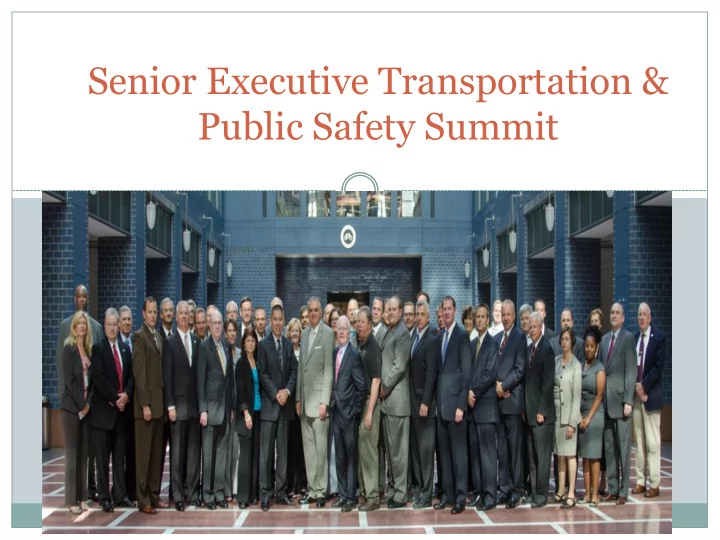

Senior Executive Transportation & Public Safety Summit
Challenges and Opportunities in Enhancing TIM Nationally Coordination Challenge – Responder groups do not have a history of coordination Opportunity – Regular coordination can improve incident response, save time and lives Institutionalization and Sustainability Challenge – Institutionalization encourages cooperation Opportunity – Leadership can empower responders Challenge – Champions are vital, but long-term viability transcends individuals Opportunity – Document, review, and revise TIM procedures; Measure performance to maintain momentum
Challenges and Opportunities in Enhancing TIM Nationally (Cont.) Consistency Challenge – Move over or slow down? Opportunity – Promote (but don’t mandate) consistency Public Awareness Challenge – TIM and responder safety laws cannot be effective without public awareness Opportunity – Changing driver behavior takes time, but can be achieved through effective marketing and education Quick Clearance Education Challenge – Ingrained practices conflict with new quick clearance procedures Opportunity – Educate relevant communities about the benefits of quick clearance
Challenges and Opportunities in Enhancing TIM Nationally (Cont.) Conflicting Priorities Challenge – Different priorities, common goals Opportunity – Competition to collaboration
Roadmap for National TIM Leadership and Innovation National Leadership & Legislation Institutional & Sustainability Practitioner Capacity Building Public Awareness & Education
National Leadership & Legislation Define & Develop Model TIM Safe, Quick Clearance Legislation for consistency & wider adoption Conduct Additional Research on Compliance with Move Over Laws Establish Structure to Advance Post-Summit Action Items Recommended to FHWA Establish National TIM Executive Leadership Group (ELG) for policy issues & needs Establish National TIM Technical Working Group (TWG) Establish National Networking Group to aid in outreach
Institutional & Sustainability Encourage major metro areas to develop TIM Committees as a platform to discuss differing goals & interests Collect and share good practices on how TIM Committees & leadership can empower the TIM Practitioners Adopt TIM Performance Measurement (PM) Systems to Determine Response and Program Effectiveness Develop a National, Consistent Definition of a Secondary Crash, Place on Crash/Incident Intake Forms & Collect data Encourage States to Begin Collecting Incident-Specific Performance Measurements with High-Priority, High- Volume Routes Educate TIM Responders on the Importance of Collecting & Reporting Performance Measures Encourage States to Gather Additional TIM PM Data on Struck-By Incidents Establish National TIM PM Pilots in Selected Jurisdictions
Practitioner Capacity Building Perform Additional Outreach & Education for the Responders Convey Importance of National-Provided TIM Responder training through USDOT Leadership Endorsement Conduct Executive Briefings/State Transportation & Public Safety Summits on Training Needs Develop & Implement Full Range of Training Courses Develop & Conduct SHRP2 TIM Responder Training Course Develop & Conduct TIM Advanced Workshops Develop & Conduct TIM Executive Leadership Awareness Training Market the Training Outcomes Explore Possibility of Continuing Education Credits Pursue Opportunities for Earlier Availability of Online Training Leverage Multi-Disciplinary Partnerships
Public Awareness & Education Conduct Effective Public Awareness Campaign on Safe, Quick Clearance Perform Additional Outreach and Education for the Public Deploy Education materials to Communities to Change Behaviors & Educate Public on the Benefits of Safe, Quick Clearance
Vision for the Future and Next Steps National Executive Leadership in TIM A Trained Community of Responders TIM Performance Measurement, Data Collection and Assessment Reduce Responder and Transportation Personnel Fatalities
Recommend
More recommend